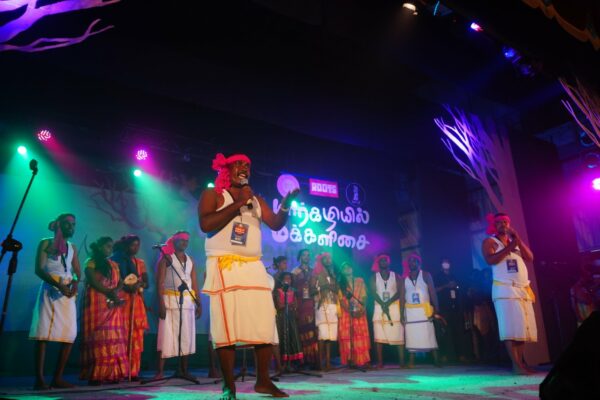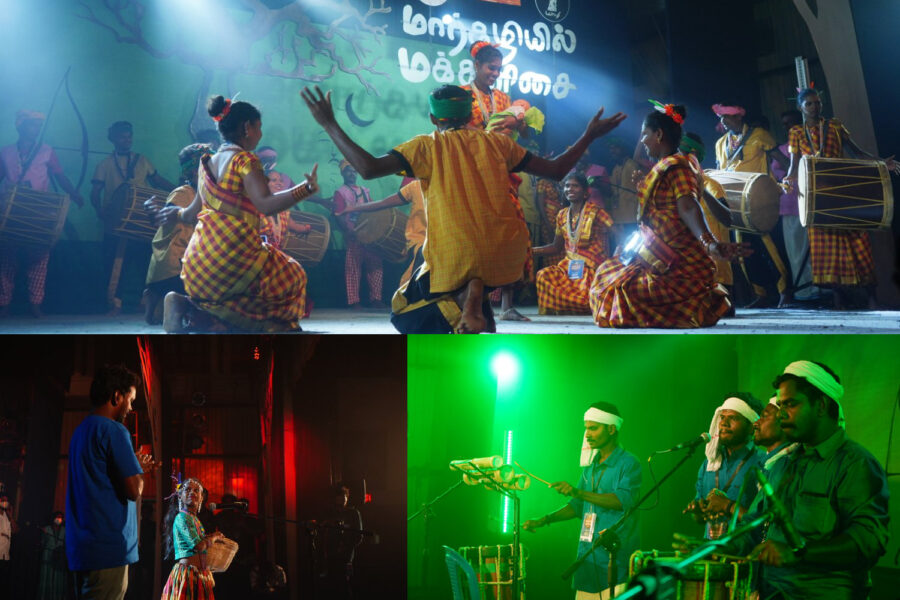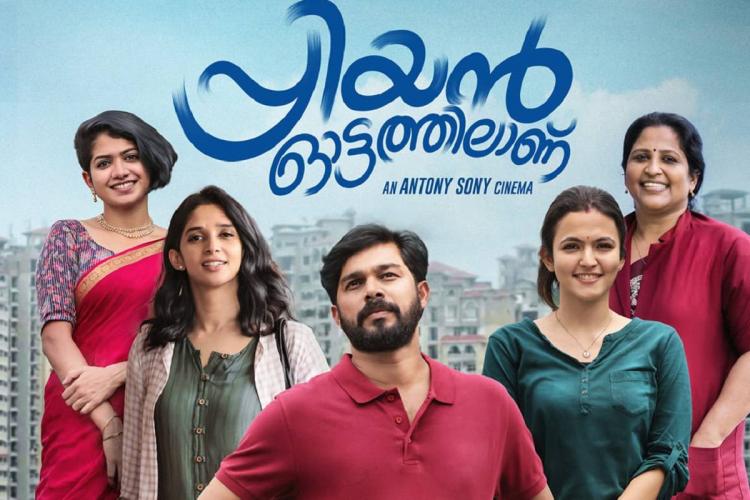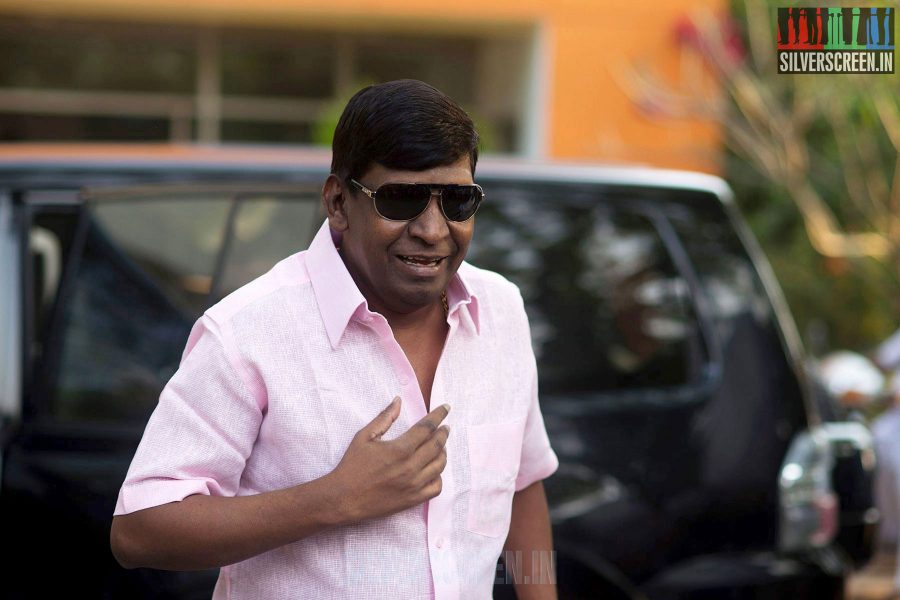The sharp beats of the opening performance of Day 7 of Marghazhiyil Makkal Isai thundered through the auditorium. The beats of Jupla Eruthu Kattu Parai overpowered the steady pattering of rain outside. As the group of 10 men danced in sync to their own beats, the audience erupted in cheers.
The performers’ confident strides and sounds belied the fact that they are the last of their community to practice and perform the art form.
Hailing from Ramanathapuram, Ramar has been practising the Jupla Eruthu Kattu Parai for years. The art form – a combination of melam (percussion), wind instruments, and dance – is commonly performed during jallikattu, or eruthu kattu as it is known in Ramanathapuram. “I have been practising this art since I was 18 years old. Today, I am around 50,” he said with a smile. This comes as a surprise after watching his highly energetic performance.
Ramar revealed that he was happy for the chance to showcase his art on the stage. “The younger generations are not eager to learn and preserve the legacy of our art. We need such stages for them to get inspired to carry it forward. We do not want this culture to perish with us,” he said.
Day 7 of the second edition of Marghazhiyil Makkal Isai, held at Raja Annamalai Mandram in Chennai, showcased a myriad of performances from various tribes in and around Tamil Nadu, including the Irular, Thodar, Oorali and Koraga, among others.
Each tribe brought forth unique performances, ranging from musical performances with instruments, singing, dancing and even using their own hands for percussion. Some performances were specific to the living conditions of the tribe. Members of the Oorali tribe from Sathyamangalam, for instance, make music using instruments that are usually used to scare away wild animals.
Before the event started, Silverscreen India spoke to the artists as they were preparing for their performances.
All the way from Karnataka
Performers from the Koraga tribe had come from Karnataka to perform the Koraga Gaja Melam at Margazhiyil Makkal Isai. Combining dance and drum beats, the members of Koraga have been practising their art form for generations.

Their troupe consists of 30 members, a mixture of first and second generation performers, including both men and women. “We are very excited. We have performed at government functions and at community events but this is the first time we are performing on a stage in Tamil Nadu,” said Ramesh, before their performance.
Thodars and ceaseless dancing
With a population of just 2000, the members of the Thodar tribe hail from Nilgiri district. Consisting of 21 members, 11 men and 10 women, their performance is a mixture of singing and dancing to the beats of hand claps. “There is no practising when it comes to our dance. We have been dancing since we were children. Our children will watch us and learn,” said Aestree Guptan.

No festivities of the Thodar community take place without dancing, he explained. “When others go to a wedding, they may just eat and return. In our society, we will definitely come and dance. Regardless of whether one is old or young, nobody leaves without dancing. Rathathula pinni pedal edukra madri irukum (It is in our bloods to put on a good show),” he said laughing.
Mulai Kalai Kuzhu’s protest for education
This is not the first time the members of the Irular tribe are performing at Margazhiyil Makkal Isai. They were also part of last year’s fest. This time, their performance was a combination of singing, speech, dancing and playing musical instruments. It highlighted the culture of the Irular community, their ancestry, and the necessity of education. “We have been performing for over six years now. We were not able to reach the people when we tried to verbally convey important messages like the need for education. However, they accept it faster when it comes through our traditional art form,” said Kanniyappan.

Kanniyappan is a part of the Mulai Kalai Kuzhu, which has been actively trying to create awareness regarding the importance of education and to preserve their culture.
Murugan, who is also a part of the troupe, believes that their culture should not be snuffed out. Murugan and his siblings are blind from birth. “I’ve always thought – how long can I be like this? Can I not get a stage and perform? If I can come to a stage like this, I believe my siblings can do so too. I would like for them to shine as well,” he said.
Vasantha is one of the female performers of the Irular tribe. Having completed her Bachelor of Education degree, she has been a part of the Mulai Kalai Kuzhu for four years now. Vasantha performs to highlight the importance of education to the younger generation of her community and to protest for their rights. “Our children should understand that it is for them that their sisters, mothers and aunts are protesting through this art,” she said.
A stage for many
With a single stage uniting various tribes from different pockets of Tamil Nadu, a sense of harmony permeated the auditorium as the artists were getting ready to perform. “We are very happy to see everyone here. We may not be able to visit the others in their areas, so it is exciting to be performing together,” said Vasantha.
“We feel proud that an event of such magnitude is happening in Tamil Nadu. I feel that we can achieve anything by getting such a stage. This unity is gratifying,” said Kanniyappan.
Marghazhiyil Makkal Isai is a music fest that has been formulated by filmmaker Pa Ranjith’s Neelam Cultural Centre, with the aim to bring the music of the people to spaces predominantly occupied by upper-class and upper-caste groups. The second edition of the festival kicked off in Madurai and then went to Coimbatore before coming to Chennai.
Recommended
With unique performances lighting up the stage, the audience had come from great distances, despite the rains, to watch the event. Akash, an 18-year-old college student, had come all the way from Trichy to see the performance. “I will make sure to take part in any event conducted by Pa Ranjith. He is like my brother,” he said.
As the evening went by, the music transitioned from rhythmic beats to folk songs and even film songs played on nadhaswarams. Even as the rain intensified outside, the enthusiasm from the audience hardly dampened. It was almost as if the rains were greeting the different tribes, all of whom share a close bond with nature. The weather could hardly spoil the mood – an emotion which the gudu gudupu performers also shared as they said, “Inime elarukum nalla kaalam pirakkum (From now, good times will be born for everyone).”



